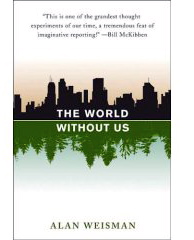How would the Earth respond if humans were suddenly to disappear? How quickly would our cities, our objects, our waste, and the myriad other changes we have wrought disappear – or would they disappear at all? Most urgently, asks this New York Times bestseller, what can we do to lessen the damage we’re inflicting on the only planet we have?
Alan Weisman
Special Projects
The World Without Us
Alan Weisman
Special Projects
The World Without Us
 In The World Without Us, Alan Weisman offers an utterly original approach to questions of humanity’s impact on the planet: he asks us to envision our Earth, without us.
In The World Without Us, Alan Weisman offers an utterly original approach to questions of humanity’s impact on the planet: he asks us to envision our Earth, without us.
In this far-reaching narrative, now translated into 34 languages, Weisman explains how our massive infrastructure would collapse and finally vanish without human presence; what of our everyday stuff may become immortalized as fossils; how copper pipes and wiring would be crushed into mere seams of reddish rock; why some of our earliest buildings might be the last architecture left; and how plastic, bronze sculpture, radio waves, and some man-made molecules may be our most lasting gifts to the universe.
The World Without Us (Thomas Dunne Books/St. Martin’s Press, 2007) reveals how, just days after humans disappear, floods in New York’s subways would start eroding the city’s foundations, and how, as the world’s cities crumble, asphalt jungles give way to real ones. It describes the distinct ways that organic and chemically-treated farms would revert to wild, how billions more birds would flourish, and how cockroaches in unheated cities would perish without us.
Drawing on the expertise of engineers, atmospheric scientists, art conservators, zoologists, oil refiners, marine biologists, astrophysicists, religious leaders from rabbis to the Dalai Lama, and paleontologists – who describe a pre-human world inhabited by megafauna like giant sloths that stood taller than mammoths – Weisman illustrates what the planet might be like today, if not for us.
From places already devoid of humans (a last fragment of primeval European forest; the Korean DMZ; Chernobyl), Weisman reveals Earth’s tremendous capacity for self-healing. As he shows which human devastations are indelible, and which examples of our highest art and culture would endure longest, Weisman’s narrative ultimately drives toward a radical but persuasive solution that doesn’t depend on our demise.
A New York Times bestseller, The World Without Us was rated the number one nonfiction book of 2007 by Time and Entertainment Weekly. It was a finalist for the 2007 National Book Critics Circle Award, winner of a Salon Book Award, and was listed among the best books of the year by Amazon, Barnes and Noble, Kansas City Star, Mother Jones, South Florida Sun-Sentinel, Hudson’s, St. Louis Post-Dispatch, and the St. Paul Pioneer Press.
Reviews
“It makes for obsessive reading. This is perhaps my favorite book this year. At once the most harrowing and, oddly, comforting book on the environment that I’ve read in many years.” – Louise Erdrich, author of Love Medicine and of National Book Award finalist The Birchbark House
“Prodigious and impressive.” – Janet Maslin, The New York Times
“One of the most satisfying environmental books of recent memory, one devoid of self-righteousness, alarmism or tiresome doomsaying ” – Pittsburgh Post-Gazette
“I don’t think I’ve read a better non-fiction book this year.” – Lev Grossman, TIME
“This is one of the grandest thought experiments of our time, a tremendous feat of imaginative reporting!” – Bill McKibben, author of The End of Nature and Deep Economy: The Wealth of Communities and The Durable Future
“The imaginative power of The World Without Us is compulsive and nearly hypnotic–make sure you have time to be kidnapped into Alan Weisman’s alternative world before you sit down with the book, because you won’t soon return. This is a text that has a chance to change people, and so make a real difference for the planet.”
—Charles Wohlforth, author of L.A. Times Book Prize-winning The Whale and the Supercomputer
“A refreshing, and oddly hopeful, look at the fate of the environment.”
—BusinessWeek
“Alan Weisman offers us a sketch of where we stand as a species that is both illuminating and terrifying. His tone is conversational and his affection for both Earth and humanity transparent.” – Barry Lopez, author of Arctic Dreams
“Brilliantly creative. An audacious intellectual adventure. His thought experiment is so intellectually fascinating, so oddly playful, that it escapes categorizing and clichés… It’s a trumpet call that sounds from the other end of the universe and from inside us all.” – Salon
“Extraordinarily farsighted. A beautiful and passionate jeremiad against deforestation, climate change, and pollution.” – Boston Globe
“The scope is breathtaking… the clarity and lyricism of the writing itself left me with repeated gasps of recognition about the human condition. I believe it will be a classic.” – Dennis Covington, author of National Book Award finalist Salvation on Sand Mountain
“Grandly entertaining.” – TIME
“Alan Weisman has produced, if not a bible, at least a Book of Revelation.” – Newsweek
“One of the most ambitious ‘thought experiments’ ever.” – The Cincinnati Enquirer
“The book boasts an amazingly imaginative conceit that manages to tap into underlying fears and subtly inspire us to consider our interaction with the planet.” – The Washington Post
“Fascinating, mordant, deeply intelligent, and beautifully written… This is a very important book for a species playing games with its own destiny.” – James Howard Kunstler, author of The Long Emergency
